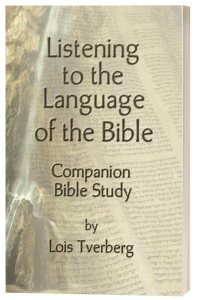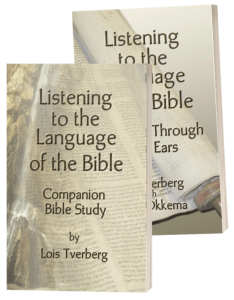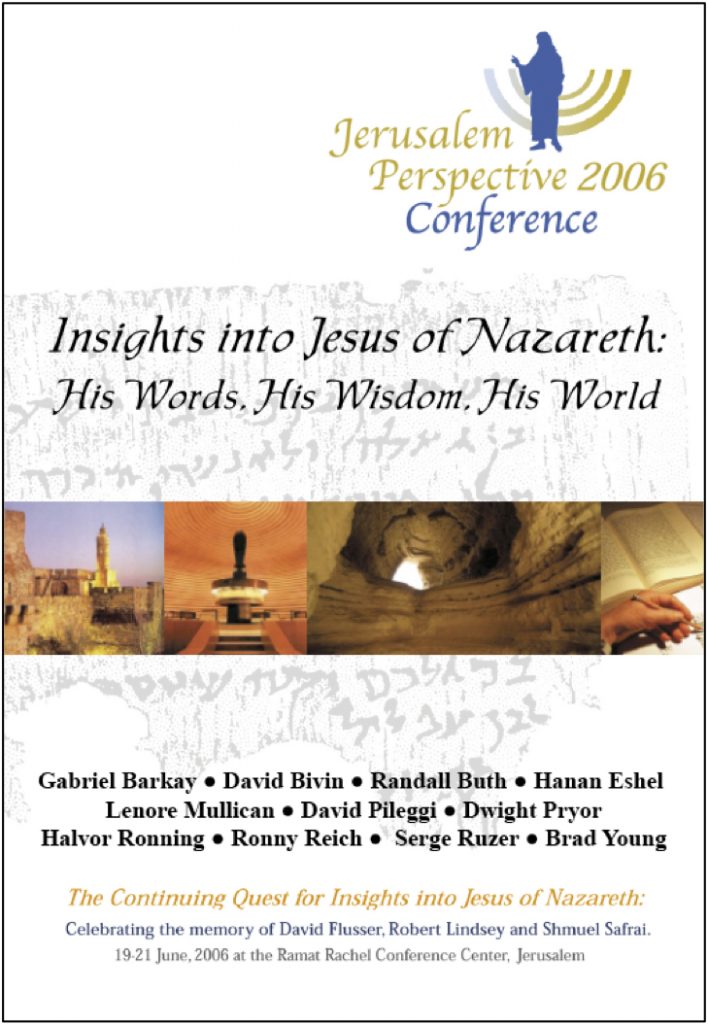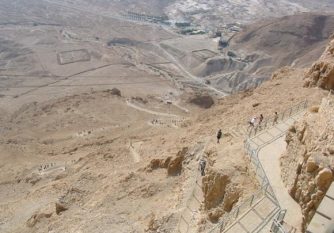Welcome to En-Gedi…
 Featured Article: (from Parables and Stories)
Featured Article: (from Parables and Stories)
Walking in the Dust of Rabbi Jesus
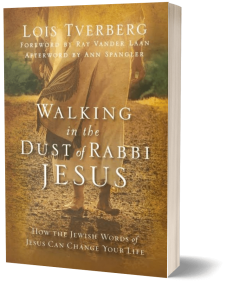 Walking in the Dust of Rabbi Jesus
Walking in the Dust of Rabbi Jesus
How the Jewish Words of Jesus
Can Change Your Life
by Lois Tverberg
© Zondervan, 2012
Paperback: $15.99 $12.99
.
.
Order the book – $12.99
.
.
Walking in the Dust of Rabbi Jesus looks at Jesus’ words in light of Jewish thought and considers how their context can yield wisdom for today. The book looks at
• How knowing Jewish idioms can help us better grasp what Jesus was saying
• How Jesus’ Middle Eastern culture sheds light on his parables, enlivening them in surprising ways
• How the Jewish world of Jesus can teach us how to pray with chutzpah or think with both hands
By understanding the religious and cultural atmosphere in which Jesus lived and taught, you’ll begin to see why his first disciples abandoned everything to follow him.
Come eavesdrop on the conversations among the rabbis of Jesus’ time. Learn how hearing Rabbi Jesus with the ears of a first-century disciple can yield practical insights that bring new depth to your spiritual life.
~~~~
The book retails for $16.99, but you can order it here for $12.99.
Special for study groups: Order 10 copies of the paperback for only $10.99 each!
Use this button to order a set of 10 copies:
Sitting at the Feet of Rabbi Jesus
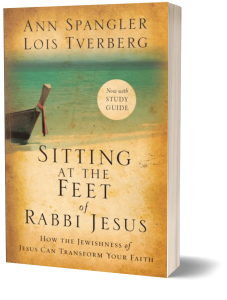 by Ann Spangler & Lois Tverberg
by Ann Spangler & Lois Tverberg
© Zondervan, 2018, 302 pages
List Price: $19.99 US
A rare chance to know Jesus as his first disciples knew him.
What would it be like to journey back to the first century and sit at the feet of Rabbi Jesus as one of his Jewish disciples? How would your understanding of the gospel have been shaped by the customs, beliefs, and traditions of the Jewish culture in which you lived?
Sitting at the Feet of Rabbi Jesus takes you on a fascinating tour of the Jewish world of Jesus, offering inspirational insights that can transform your faith. Ann Spangler and Lois Tverberg paint powerful scenes from Jesus’ ministry, immersing you in the prayers, feasts, history, culture, and customs that shaped Jesus and those who followed him.
You will hear the parables as they must have sounded to first-century Jews, powerful and surprising. You will join the conversations that were already going on among the rabbis of his day. You will watch with new understanding as the events of his life unfold. And you will emerge with new excitement about the roots of your own Christian faith.
Sitting at the Feet of Rabbi Jesus will change the way you read Scripture and deepen your understanding of the life of Jesus. It will also help you to adapt the rich prayers and customs you learn about to your own life, in ways that both respect and enrich your Christian faith.
By looking at the Jewishness of Jesus, Ann Spangler and Lois Tverberg take you on a captivating journey into the heart of Judaism, one that is both balanced and insightful, helping you to better understand and appreciate your own faith.
Note: This is the updated version that includes a study guide and instructions for a home seder meal. (Paperback)
Download a sample chapter (pdf)
Sitting at the Feet of Rabbi Jesus is available for $12.99 ($7 off the cover price).
New Light on the Difficult Words of Jesus
 by David Bivin
by David Bivin
© 2006, En-Gedi Resource Center
Softcover, 208 pages, ($14.99/$13.99)
Download a sample chapter (pdf)
David Bivin is the founder and editor of Jerusalem Perspective, a journal that explores the Jewish context of the Gospels. He has traveled and lectured internationally for more than 25 years, and is the author of hundreds of articles on that subject.
New Light on the Difficult Words of Jesus is a collection of some of his best writing on the Jewishness of Jesus, edited for the general reader. The book examines Jesus’ lifestyle as a first-century Jewish rabbi, and looks at how his words would have been understood within the larger framework of first-century Judaism. Many scholarly footnotes make it a valuable help to those who want to study in depth.
“In Jerusalem, David Bivin has interacted for decades with some of the best Jewish scholarship in the world. This book displays many of the brilliant Hebraic gems the author has mined that help illuminate the pages of the Gospels. Clearly written and very readable, Bivin shows why Christians need rabbinic sources if they intend to know and understand Jesus in his first-century Jewish setting. New Light on the Difficult Words of Jesus is a valuable resource for every serious student of Scripture.”
— Marvin Wilson, Author of Our Father Abraham: The Jewish Roots of the Christian Faith
From the book’s introduction:
The intention of this book is to give people knowledge of Jesus, in the Hebraic sense of the word. Rather than being purely factual and academic, we desire to let people know him relationally and experientially, as a disciple would, after walking in his footsteps for many years.
In the first section we introduce the reality of Jesus as a Jewish rabbi, showing his heart for teaching and his high expectations of his disciples, and therefore us.
Next we look at how Jewish he was, utterly a part of his first-century world, rather than being opposed to it, as many have believed. Then we look at the Jewishness of his teaching — how he used rabbinic terms and logic, and how his words are greatly clarified by hearing them in the context of other rabbinic sayings of his time.
Finally, we share some ideas on life in his Kingdom — living out our calling as ingrafted members of the Olive Tree of Israel, of which he is the “Righteous Branch”!
Order New Light on the Difficult Words of Jesus ($14.99/$13.99).
Listening to the Language of the Bible
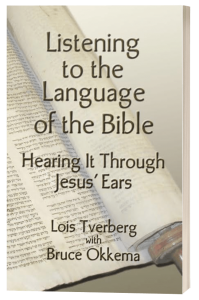 By Lois Tverberg, with Bruce Okkema
By Lois Tverberg, with Bruce Okkema
© En-Gedi Resource Center, 2004
Softcover, 180 pages
Download a Sample (pdf)
Order Now: ($14.99/$12.99)
(But more ordering options are below…)
Listening to the Language of the Bible is a guide for discovering the richness of the Scriptures in their Hebraic setting.
The book contains more than 60 brief, illustrated devotional articles that unpack the meaning of biblical words and phrases for life today. By examining the Hebrew and Jewish cultural context of some of the Bible’s odd-sounding phrases, it shares insights that clarify reading and deepen Bible study.
Listening looks at many topics from the perspective of the ancient writers, including prayer, family and the promised Messiah. It also looks at the words of Jesus in light of first-century Jewish culture.
“This is an excellent guide for discovering the richness of the Scriptures in their Hebraic setting. It’s wonderful – balanced, simple to understand, yet packed with deep information.” Robin Sampson, President, Heart of Wisdom Publishing, Stafford, VA
The book can be read by itself for a brief overview, or with a Companion Bible Study (Lois Tverberg, 2005) as a guide to explore the Scriptures from a Hebraic perspective. Questions for each chapter point out other relevant passages and share applications for living. At the end of the study guide, Tverberg shares her own thoughts on many of the questions.
Download a LLB Study Sample from the Companion Bible Study
Order Now: ($6.99/$6.49)
Order together and save!
You can buy Listening to the Language of the Bible and its Companion Bible Study as a set for ($21.98/$16.99). Save on both books, plus shipping.
Insights into Jesus of Nazareth Seminar
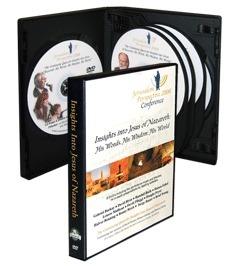 Insights into Jesus of Nazareth
Insights into Jesus of Nazareth
His Words, His Wisdom,
His World
Conference Seminar
Available as an 8-DVD set or mp3 CD (audio only). Order below. (Back in stock! – Aug 2024)
© En-Gedi Resource Center, 2006
15 hours of in-depth presentations by leading scholars on Jesus’ first-century context. Filmed at the Jerusalem Perspective 2006 Conference in Jerusalem, Israel, June 19-20, 2006.
Presentations:
The Value of Translating Matthew, Mark and Luke to Hebrew
David Bivin, Editor of Jerusalem Perspective
A Hebraic Approach to the Resurrection of Jesus
Randall Buth, Director, Biblical Language Center
Is Jesus Superior to the Law? -and-
Jesus’s High Self-Awareness and the Christology of Paul
Dwight A. Pryor, President, Judaic-Christian Studies Center
Why Rabbinic Literature Is Pertinent to the Study of the Gospels -and-
Jesus Among the Rabbis: Spiritual Life and Leadership
Brad Young, Professor, Oral Roberts University
The Mikvah and Ritual Immersion in Jesus’ Day
The Recently Discovered Pool of Siloam (Audio online at link)
Ronney Reich, Archaeologist, Haifa University
The New Testament in the Light of the Dead Sea Scrolls
Hanan Eshel, Archaeologist, Bar Ilan University
Was Jesus Buried in the Garden Tomb? (DVD only)
Gabriel Barkay, Archaeologist, Bar Ilan University
Jeremiah’s New Covenant and Jesus’ Movement
Serge Ruzer, Professor, Hebrew University
Jesus, the Sin-Fearer
David Pileggi, Rector, Christ Church
Jesus’ Teaching Style Illustrated by His Response to Martha’s Anxiety
Lenore Mullican, Professor, Oral Roberts University
The Pastoral Relevance of Who Wrote the First Gospel -and-
The Importance of Bible Geography for Understanding Jesus
Halvor Ronning, Director, Home for Bible Translators
.
8-DVD Set: $49.99
.
Also included on DVDs (not audio CD)
• A tribute to David Flusser by James Charlesworth
• A documentary about Robert Lindsey and David Flusser
• Baritone Horst Krueger performing songs of Jerusalem and conference music composed by Robert Lindsey.
© Produced by the En-Gedi Resource Center in cooperation with JerusalemPerspective.com. All rights reserved.
God is Our Refuge
by Bruce Okkema
In you, O LORD, I have taken refuge; let me never be put to shame. Rescue me and deliver me in your righteousness; turn your ear to me and save me. Be my rock of refuge, to which I can always go; give the command to save me, for you are my rock and my fortress. Psalm 71:1-3
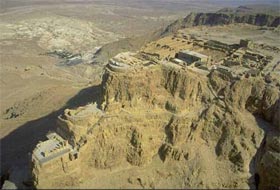 Masada stands as a huge outcropping of rock jutting 1,440 feet above the desert floor on the western shore of the Dead Sea. It is located fourteen miles north of the southern end of the sea and eleven miles south of En-gedi. Masada remains today one of the Jewish people’s greatest symbols, and except for Jerusalem, it is the most popular destination of people visiting Israel.
Masada stands as a huge outcropping of rock jutting 1,440 feet above the desert floor on the western shore of the Dead Sea. It is located fourteen miles north of the southern end of the sea and eleven miles south of En-gedi. Masada remains today one of the Jewish people’s greatest symbols, and except for Jerusalem, it is the most popular destination of people visiting Israel.
Its history as a desert fortress goes back far into the past. David moved throughout this region of the southern Judean desert as he was hiding from Saul, and quite likely spent time on this mountain. Although Masada is not mentioned by name in the Bible, we see glimpses of it in several places where God is called a “rock of refuge,” or “my fortress.” Metzudah means “refuge” or “fortress” in Hebrew. (In addition to our text above, see also 1 Sam 22:4-5, 23:14, 24:22, and Psalms 18:2, 31, and 144:2.)
The remains that we we see today are from the time of Herod, who not only increased the fortifications, but built magnificent garden palaces on either end of the mountain. It almost never rains here, yet Herod built an elaborate water system to divert water that originated in the Judean mountains into cisterns at Masada. Servants carried water from there to upper reservoirs servicing the palaces, to an Olympic size swimming pool!
The reason Masada is one of the Jewish people’s greatest symbols is for what occurred there during the Jewish revolt against Rome during 66 – 72AD. A group of Zealots took Masada and it became a place of refuge for other Jews fleeing the Roman terrorism. For three years they were able to fend off the Romans and worship the Living God while enduring the rigors of desert life. Finally, faced with certain capture and torture, the group of 960 chose to take their own lives, rather than become slaves of Rome. “The valor of the Jewish zealots residing on Masada during the Roman siege is celebrated as the supreme example of self-sacrifice for the preservation of the nation of Israel. Today, when the recruits of the Israel Armored Corps take their oath of allegiance, they do so on Masada to remind each generation of the price their forefathers paid for their nation. They cry: “Masada shall not fall again!” (1)
A view of the snake path from the top of Masada
To climb the arduous snake path in the 120° sun, to imagine looking down helplessly from above on your fellow countrymen enslaved to build a siege ramp against you, to stand at the precipice thinking across history about all the many who have served the Lord at the cost of their lives is to wonder if I will have the courage to stand that test for my Lord one day.
Therefore, you kings, be wise; be warned, you rulers of the earth. Serve the LORD with fear and rejoice with trembling. Kiss the Son, lest he be angry and you be destroyed in your way, for his wrath can flare up in a moment. Blessed are all who take refuge in him. Psalm 2:10-12.
Additional sources for this article:
(1) http://www.ancientsandals.com/overviews/masada.htm
http://www.jewishvirtuallibrary.org/jsource/Judaism/masada.html
Josephus Flavius, Jewish Wars, Chapter 8 http://www.templebuilders.com
Women of Valor
by Lois Tverberg
A woman of valor, who can find? Her preciousness is far beyond jewels. Proverbs. 31:10
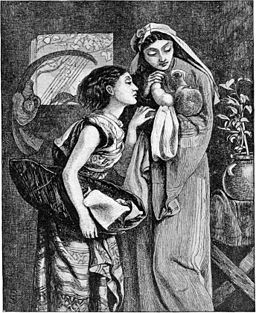 What can the women of today learn from the Bible’s words for women from within its cultural perspective? How much should we see as specific to its world, and how much is timeless? This second question is difficult, with a wide variation of opinions. Nevertheless, understanding more about what the biblical world of women was like will allow us to better grasp what the Bible is saying for women today.
What can the women of today learn from the Bible’s words for women from within its cultural perspective? How much should we see as specific to its world, and how much is timeless? This second question is difficult, with a wide variation of opinions. Nevertheless, understanding more about what the biblical world of women was like will allow us to better grasp what the Bible is saying for women today.
For instance, just looking at the passage above, most recognize it as about the “virtuous wife.” How can it be translated as “woman” instead of “wife”? Because the word in Hebrew for wife is ishah, (ee-SHAH) which does mean “woman” as well as “wife.” This is because in biblical times, it was assumed that every woman would marry. It could really not be any other way, because in that time, no one could survive on his or her own. Large families were needed to raise enough food to survive and provide protection from enemies. In illness or an emergency you always turned to your family. To not marry was unthinkable, for both men and women.
 The second word, translated as “virtuous” or “valor” is hiel, (hi-EEL) and it is often used to describe warriors, like “David’s mighty men of valor” – his elite fighting team (2 Samuel 17:10). It can mean strength, courage, power, or moral virtue. To be a woman of hiel is great indeed!
The second word, translated as “virtuous” or “valor” is hiel, (hi-EEL) and it is often used to describe warriors, like “David’s mighty men of valor” – his elite fighting team (2 Samuel 17:10). It can mean strength, courage, power, or moral virtue. To be a woman of hiel is great indeed!
If the idea that a woman can have valor surprises you, you might also not have noticed that women made several contributions to the Scriptures. Miriam, Deborah, Hannah and Mary all composed songs that are recorded in the biblical text. And, believe it or not, Proverbs 31 was actually composed by a woman. The chapter starts with the note, “The words of King Lemuel, an oracle that his mother taught him.”
Say to Wisdom, You are My Sister
How much precedent was there for women as teachers in the Bible? Well, the woman of valor in Proverbs 31 was praised because “She opens her mouth with wisdom, and the teaching (torah, literally, or “law”) of kindness (hesed) is on her tongue.” (vs. 26) A mother is called to be a teacher of her family. Earlier in Proverbs it also tells sons to learn from their mothers as well as their fathers:
Hear, my son, your father’s instruction,
and forsake not your mother’s teaching,
for they are a graceful garland for your head and pendants for your neck. vs 1:8-9
In fact, a good portion of the book of Proverbs is narrated by the voice of a woman. Wisdom itself is personified as a woman who calls to young men in the streets and invites them to listen to her wise counsel. She is the one speaking for much of Proverbs 1-3 and chapters 8-9.
Proverbs provides quite a bit of precedent for women as teachers, even within their traditional roles of wives, mothers and sisters. We should consider the advice of Proverbs 7:4,
“Say to wisdom, you are my sister
and call insight your intimate friend,
to keep you from the forbidden woman,
from the adulteress with her smooth words.”
In some Christian circles, young men are taught to be wary of women and sexual temptation. What if instead of only focusing on viewing them sexually, they learned to say, “Wisdom, you are my sister”? Then they would be able to relate to women as sisters and aunts who may have much sound wisdom to share.
Images: John Heseltine & Pam Masco, Jonathan Chng on Unsplash,
Redemption at Passover
by Lois Tverberg
“I am the LORD, and I will bring you out from under the burdens of the Egyptians, and I will deliver you from their bondage. I will also redeem you with an outstretched arm and with great judgments. Then I will take you for My people, and I will be your God.” Exodus 6:6-7
The theme of Passover is redemption, when God redeemed his people from slavery from Egypt. We miss the full implications if we don’t understand the ancient meaning of that word. If a man fell into debt and went into slavery, a kinsman would be needed to “buy” him back to freedom. But once the man was redeemed by being “purchased,” his relationship to his redeemer changed. Now he was specifically bound to his redeemer, and he became “his,” only as a close family member, not as a slave. As an example, when Boaz acted as kinsman redeemer to Ruth, she became his wife (Ruth 4:9-10).
God is using this image when He told Moses to say to His people,
`I am the LORD, and I will bring you out from under the burdens of the Egyptians, and I will deliver you from their bondage. I will also redeem you with an outstretched arm and with great judgments. `Then I will take you for My people, and I will be your God. (Exodus 6:6-7)
God is saying that He will redeem them as a kinsman would, and purchase them as His own people, forming a relationship so that they would be uniquely His, and He would be their God. This verse is recited every year at Passover to remember the relationship that God began with His people through His redemption.
Each of the four verbs God used in the promise above (bring out, deliver, redeem, and take) is related to one of the four cups of wine used in the Seder meal. The third cup of the Passover meal is called the Cup of Redemption, and was associated with God’s promise, “I will redeem you”. This is the cup that Jesus held up at the last Passover supper, and said was His blood shed to redeem us as His people, in a new covenant for the forgiveness of sins. Jesus is describing how through His atoning death, he has “purchased us”, to set us free from slavery to sin and death. By this transaction, we have been brought into a new relationship with Him as His covenantal people. His disciples understood the magnitude of Jesus’ redemptive “purchase” of us and expressed it this way:
…You were not redeemed with perishable things like silver or gold from your futile way of life inherited from your forefathers, but with precious blood, as of a lamb unblemished and spotless, the blood of Christ. 1 Pet 1:18-19
Praise the Lord for the great purchase that He made 2000 years ago, when the cup of suffering became the cup of redemption, when He purchased us as His people. Whenever you think of His death and resurrection, remember that we are not our own, but we are His, bought with a price. That should make us eager to serve our resurrected King, Christ the Lord.
Mighty One of Israel
by Scott Leys
“I am Yahweh your God, who brought you out of the land of Egypt, out of the house of bondage.” Exodus 20:2 (World English Bible)
The Hebrew language is a language short on vocabulary. Often times a single Hebrew word can have many nuances of meaning depending on suffixes, prefixes, and context. One word may serve to convey many different ideas or word pictures, making for a very poetic, but not a very concise language. There is one glaring exception to this rule though.
Have you ever stopped to consider what our Heavenly Father means when He identifies Himself as our God? In the passage above, the Hebrew word translated as God is Elohim. To the Hebrews it carried the connotation of Yahweh as the creator of all things. Interestingly there are several other Hebrew words that have been translated as God in our English versions of the Bible. So while the Hebrew language as a rule is word poor, the writers of the Hebrew Scriptures under the inspiration of the Holy Spirit, were very specific in assigning attributes to the Almighty.
Other Hebrew words translated as God include: El(identifying Yahweh in all His power and magnificence); Eloah(identifying Him as the mighty one to be worshiped, contrasted with false gods); Elyon(usually translated Most High God – identifying Him as the possessor of heaven and earth); and El Shaddai(usually translated as God Almighty – identifying Him as our nourisher and all bountiful giver).
What significance does this have for us? Our Father intended for us to know Him in a very personal and intimate way. He shows Himself to us by letting us in on these different personality traits. He wants us to understand every aspect of who He is and what He does for us. Many of us have a personal relationship with our Savior Yeshua, but we sometimes fail to realize Yahweh revealed Himself to His creation from the very beginning in this same personal way.
The next time you come across God in the Old Testament, pull out a concordance and look up the Hebrew word. You might be surprised at the treasure you find.
Dayeinu – It Would Have Been Enough
by Lois Tverberg
If He had rescued us from Egypt,
but not punished the Egyptians,
It would have been enough. (Dayeinu )If He had punished the Egyptians,
but not divided the Red Sea before us,
It would have been enough.If He had divided the Red Sea before us,
but not supplied us in the desert for 40 years,
It would have been enough.If He had supplied us in the desert for 40 years,
but not brought us to the land of promise,
It would have been enough.If He had brought us to the land of promise,
but not made us a holy people,
It would have been enough.How much more, then, are we to be grateful to God for all of these good things which he has indeed done for all of us!
The verses above are from a much longer melody that is sung at Passover celebrations every year. It is a very ancient song, written about 1000 years ago. It is one of my favorite parts of the celebration, as a long list of God’s blessings are recounted, with the idea that if God would have stopped at any one, they would have been completely satisfied. What a wonderful attitude of gratefulness! How much longer would the list be if we as Christians added to them…
If He had redeemed me with His suffering and death,
but not filled me with His Spirit,
it would have been enough.If He had filled me with His Spirit,
but did not guide my life daily as His disciple,
it would have been enough.If He guided my life daily as His disciple,
but did not lovingly answer my prayers,
it would be enough.If He lovingly answered my prayers
but did not give me His promise to spend eternity with Him,
it would be enough.(Add your own verses here!)
How much more, then, are we to be grateful to God for all of these good things which he has indeed done for all of us!
We’re pleased to be able to share this difficult-to-find classic by Brad Young. Check it out!
The Jewish Background to the Lord’s Prayer
by Brad H. Young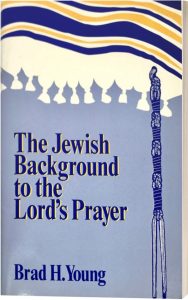
© 1984, Gospel Research Foundation Inc.
Softcover, 46 pages, $8.99
- Explore the Jewish roots of the Lord’s Prayer
- Learn how the Dead Sea Scrolls, rabbinic literature, Jewish prayers, and worship breathe fresh meaning into the revered words of the Lord’s Prayer
- Understand Jesus’ powerful prayer better in the light of Jewish faith and practice
Dr. Brad H. Young (PhD Hebrew University, under David Flusser) is the founder and president of the Gospel Research Foundation in Tulsa, Oklahoma. He is emeritus professor of Biblical Literature in Judaic-Christian Studies in the Graduate School of Theology at Oral Roberts University. Young has taught advanced language and translation courses as well as the Jewish foundations of early Christianity to graduate students for over thirty years.
Check out what else is available from the En-Gedi Resource Center bookstore too…
